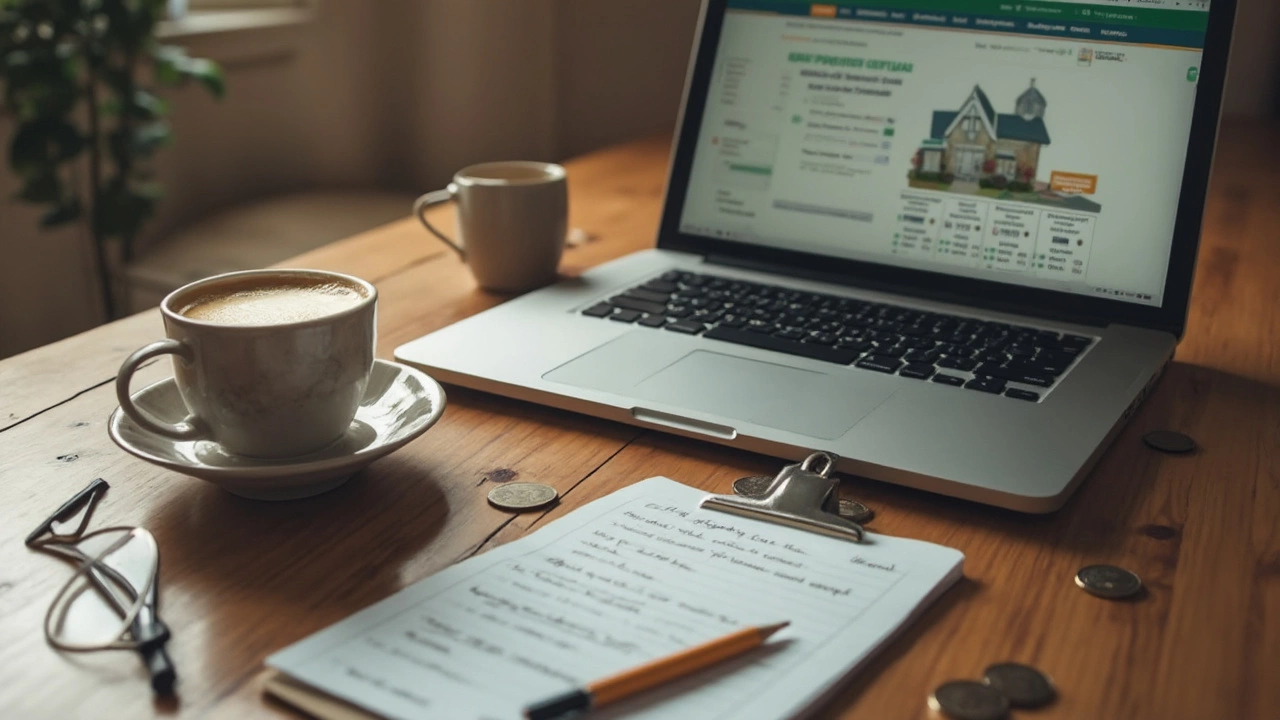Ever try guessing your home’s value and end up nowhere close? Happens all the time. Most folks just check big real estate websites and call it a day, but those estimates swing wildly. Getting the real number isn’t just about curiosity—you want solid facts for things like selling, refinancing, or even pulling out a loan. Know how much your place is worth and you’ll sidestep nasty surprises down the road.
Let’s cut through the noise. I’ll show you the easiest ways to figure out your property’s value, from simple free checks to when it actually pays off to call in the pros. No confusing jargon, just straight-up tips and facts. It’s the same stuff I used when deciding if new windows or a fresh coat of paint would nudge my place up a notch on the market.
- Why You Need to Know Your Property Value
- DIY Ways to Check Your Home's Worth
- When to Call the Pros: Agents and Appraisers
- Common Mistakes and Surprises in Valuation
- How to Boost Your Property’s Value
Why You Need to Know Your Property Value
You might think knowing your property value is only necessary if you want to sell, but there’s plenty more riding on that number. The right figure affects everything from your mortgage to how much you fork out in property taxes. Mess up your estimate, and you could end up paying more than you should, or worse—leave cash sitting on the table.
Here’s why that number matters:
- Refinancing: Banks use your home appraisal to decide if they’ll let you refinance or how much you can borrow. Being off by tens of thousands can leave you with fewer deals, or worse rates.
- Selling: The listing price totally depends on nailing your market value. Too high, and your place sits forever; too low, and you lose out big time. Real estate agents will always ask, “What do you think your house is worth?”
- Property tax assessment: Local governments use value estimates to set your tax bill. Inaccurate numbers can lead to overpaying, and appealing a wrong assessment? It all starts with knowing your real number.
- Insurance: The cost of your homeowner’s insurance is usually tied to what it would take to rebuild based on home value. Outdated estimates mean you could be underinsured or overpaying.
- Home equity loans: Want to remodel, or maybe take out a loan for something major? Lenders will look closely at how much your home is worth before cutting a check.
Here’s a quick look at how value can impact your bottom line:
| Situation | Potential Gain/Loss |
|---|---|
| Listing price off by $25,000 | You might overpay in time or leave cash behind |
| Over-assessed for taxes by 10% | Paying hundreds or thousands extra per year |
| Underestimating for insurance | Big risk if disaster hits—repairs may not be fully covered |
In short, treating your property worth like a guess isn’t just risky—it can actually cost you real money. Even if you’re not planning to move, knowing your house worth keeps you in control when life throws you surprises or opportunities.
DIY Ways to Check Your Home's Worth
You don’t have to be a real estate agent to get a decent idea of your property value. There are a bunch of free tools you can use to make a smart guess before you ever talk to a pro.
Starting with online estimators makes sense. Sites like Zillow, Redfin, and Realtor.com let you plug in your address and spit out an instant value. They pull from recent home sales and market trends in your neighborhood. While these ‘Zestimates’ and others aren’t exact, they give you a ballpark figure and let you spot wild differences if you check a few sites.
Want a more hands-on approach? Look up nearby homes that sold in the last six months. Focus on places about the same size, age, and style as yours—real estate people call these “comps.” Adding or subtracting a bit depending on things like a new roof or an extra bathroom is totally fair game.
- Check county tax records: Your local government posts what they think your house is worth. Sometimes they’re behind on updates, but it’s a good second opinion.
- Talk with neighbors: Ever notice someone’s house just sold? Ask what they got and how fast it moved. Actual sale prices beat listing prices for accuracy.
- Use mortgage lenders’ online tools: Some big banks and credit unions have property value tools right on their websites. They use their own secret sauce to figure estimates, mixing public sales data and market trends.
Keep in mind, online values bounce around if your area isn’t super active with recent sales. But if your neighborhood’s seeing a lot of movement, those estimates get closer to reality. Here’s a quick peek at how three top online tools usually stack up:
| Tool | Average Margin of Error* |
|---|---|
| Zillow Zestimate | 2.4% (for on-market homes) |
| Redfin Estimate | 2.08% (for homes currently listed) |
| Realtor.com Value | Ranges from 3% to 6% |
*Based on official company stats reported in early 2024
When you crunch different numbers together—online value, recent comps, and tax records—you’ll get a much better read. Just don’t get hung up if one tool gives you a number way off. Treat them all as clues, not gospel.

When to Call the Pros: Agents and Appraisers
Sometimes, checking your property’s value online just won’t cut it. If you’re gearing up to sell or need a dead-on number for refinancing, it’s time to bring in some real muscle—a real estate agent or a licensed appraiser. These pros don’t just guess; they dig into the details and compare hundreds of property value markers you’d never spot on your own.
Real estate agents usually offer a Comparative Market Analysis (CMA). This isn’t the same as a full-blown appraisal, but it gets close for most folks thinking about listing their homes. An agent will look at actual sales nearby, the state of the market, and even small stuff like your landscape or modern appliances. Most agents do CMAs for free, hoping you’ll hire them to sell your place. Not a bad deal if you want a quick but fairly solid estimate.
- Perfect if you’re prepping to sell or just want a smart price to list.
- They’ll catch things you might miss—like how much a renovated kitchen bumps your home appraisal up.
Licensed appraisers are on another level. Banks and lenders use them to figure out your property value before approving big loans or refinancing. These folks follow state and national rules for appraisals and actually visit your home. They’ll measure, photograph, and grade everything from your roof’s age to the type of heating system you use.
- Mandatory for refinancing, securing a mortgage, and settling estates or divorces.
- Appraisals are super detailed and usually cost between $300 and $500 for a single-family home as of 2024.
| Who to Call | When You Need Them | Quick Facts |
|---|---|---|
| Real Estate Agent | Listing your house, getting a CMA | Usually free, fast, gives you a range |
| Licensed Appraiser | Refinancing, legal disputes, mortgage | Costs $300-500, lender-required |
Honestly, if your bank or court’s involved, don’t mess around—get an appraiser. For everything else, a solid agent usually does the trick. When in doubt, ask: if the answer must be official, choose a licensed appraiser. Otherwise, agents are a good first stop for getting your house worth estimate.
Common Mistakes and Surprises in Valuation
Let's be real—most people get the price of their place wrong on the first try. It’s way too easy to fall into traps that mess up your property value estimate. One classic blunder: just averaging a few neighbor’s asking prices. Listing prices aren’t the same as what homes actually sell for. You can spot a place marked $450,000, but it could quietly sell for $400,000. That’s a big difference, right?
Here’s another common mistake: ignoring upgrades or issues that really matter. You might think, “Hey, I added a cool deck!” but if your roof’s leaking or your foundation is old, buyers and appraisers zero in on those more. Even little things like kitchen upgrades matter less if there’s a big-ticket repair needed elsewhere.
- People love to guess their home’s value just from the latest Zestimate or online tool, but those can be $10,000–$50,000 off, especially if there aren’t many recent sales nearby.
- Not all square footage is equal—finished basements often don’t count toward the main house square feet in many appraisals, yet owners expect big bumps for them.
- Upgrades you love (hot tubs, bold paint colors, that fancy tile you installed yourself) may not add real value if buyers aren’t into it.
Every now and then, there’s a surprise boost. Here are a few things that have raised home values lately:
- Houses with dedicated home office space are worth more now—COVID changed what buyers want.
- Recent energy-saving upgrades (like new windows or insulation) can tip your home above similar ones, especially in areas with tough winters.
- Homes with fiber internet options on the street sometimes fetch higher prices, even compared to near-identical homes around the corner.
Here’s a quick look at how online estimates have stacked up against real sale prices in 2024, according to a local report in my area:
| Tool | Average Error (Local 2024) |
|---|---|
| Zillow Zestimate | +/- $35,000 |
| Redfin Estimate | +/- $27,000 |
| Realtor.com | +/- $32,000 |
The bottom line? Always double-check. Pull recent sale prices (not just listings), check in with a local pro if you’re thinking of selling, and don’t let that shiny new appliance blind you to roof leaks or outdated wiring. Getting property value right is all about the details and keeping it real, not just reading a quick online estimate.

How to Boost Your Property’s Value
Bumping up your property value doesn't have to mean draining your savings or doing a full remodel. Some changes pack a much bigger punch than others, so it's all about working smarter, not harder.
The first thing most buyers check? Curb appeal. Simple stuff like a fresh coat of paint, power washing the driveway, or cleaning up landscaping can make a home feel way more inviting. According to a recent survey from the National Association of Realtors, cleaning up the yard alone can add as much as 3% to your home’s value. That’s an easy win.
Here are upgrades that actually move the needle for your home appraisal:
- Kitchen updates: You don’t need a full renovation. Swapping outdated cabinet handles, adding a tile backsplash, or switching to LED lights can totally change the vibe without wrecking your budget. Real estate pros often say kitchens and bathrooms sell houses.
- Modern bathrooms: Replacing grimy grout, adding a new vanity mirror, or updating faucets does wonders. Even swapping out the toilet seat for something fresh can make an old bathroom feel new.
- Energy-saving features: Double-pane windows, smart thermostats, and energy-efficient appliances can make your house look modern and attract buyers. According to Zillow (2024 data), listings mentioning energy efficiency sold for up to 2% more than expected.
- Fix what’s broken: If there’s a leaky faucet, dodgy wiring, or broken tiles, now’s the time. Inspectors and appraisers notice, and fixing these small things removes reasons for buyers to haggle down your price.
- Declutter and deep clean: Sounds basic, but nothing puts off buyers or appraisers faster than overflowing closets or stained carpets. It makes everything look smaller and messier than it is.
Wondering which updates bring the best return? Check out this table from Remodeling Magazine’s 2024 Cost vs. Value Report—these are national averages for resale returns:
| Upgrade | % of Cost Recouped |
|---|---|
| Garage Door Replacement | 97% |
| Manufactured Stone Veneer | 93% |
| Minor Kitchen Remodel | 85% |
| Entry Door Replacement (Steel) | 88% |
| Bathroom Remodel | 72% |
If you’re serious about getting top market value, don’t chase trends that won’t last or pour money into super-specific upgrades like custom wallpaper. Instead, keep things clean, neutral, and well-maintained. And if you’re not sure, chat with a trusted real estate agent—they see firsthand what’s making buyers pay more in your neighborhood.
